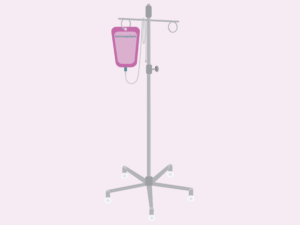Exploring Medicine
Treatment Options
If you’re living with heart failure, you may need medicines to help keep your heart and body healthy.
If you’re in the hospital, medicine is often given through an IV (intravenous therapy).
If you are at home, or ready to leave the hospital, your medicines will be taken by mouth.
If you’re living with heart failure, you may need medicines to help keep your heart and body healthy. If you’re in the hospital, medicine is often given through an IV (intravenous therapy). If you are at home, or ready to leave the hospital, your medicines will be taken by mouth.
1
Types
Anticoagulants
Overview
Overview

Anticoagulants thin the blood in order to prevent or treat blood clots. A blood clot is a clump of gel-like blood that can get stuck in your veins, arteries, or heart. Blood clots are dangerous because they can cause heart attacks and strokes.
When you have heart failure your care team may choose to put you on an anticoagulant to prevent blood clots from forming in your heart. If you are in the hospital, it may be given to you through an IV. Once you are ready to leave the hospital, you will most likely take this medicine by mouth.
Your doctor will increase and decrease the dose of your blood thinner medicine based on your lab values in order to make your levels as perfect as possible.
If you require advanced therapy, such as a VAD, you will always need to take anticoagulants. To learn more about taking anticoagulants when on a VAD, refer to your device information in the Knowing Your Device and Understanding Surgery section.
-
Bivalirudin (Angiomax)
-
Heparin
Bivalirudin (Angiomax)
Bivalirudin is an anticoagulant that helps treat and prevent blood clots. This medicine will be given in the hospital through your IV continuously. Bivalirudin is sometimes used together with aspirin. While you are on bivalirudin, you will need frequent labs to monitor the thickness of your blood is and your dose will be adjusted based on those labs. The labs that your team follows to adjust your bivalirudin are the PTT and the DTT.
Common side effects:
- Easy bleeding and bruising
- Upset stomach
- Nausea
- Vomiting
- Anxiety
- Headache
Heparin
Heparin is another type of anticoagulant that helps treat and prevent blood clots. This medicine is also given in the hospital through your IV continuously. Heparin is sometimes used together with aspirin. While you are on Heparin, you will need frequent labs to monitor the thickness of your blood, and your dose will be adjusted based on those lab results. The labs used to monitor Heparin include the PTT and the Unfractionated Heparin level.
Common side effects:
- Easy bleeding and bruising
Bivalirudin (Angiomax)
Bivalirudin is an anticoagulant that helps treat and prevent blood clots. This medicine will be given in the hospital through your IV continuously. Bivalirudin is sometimes used together with aspirin. While you are on bivalirudin, you will need frequent labs to monitor the thickness of your blood is and your dose will be adjusted based on those labs. The labs that your team follows to adjust your bivalirudin are the PTT and the DTT.
Common side effects:
- Easy bleeding and bruising
- Upset stomach
- Nausea
- Vomiting
- Anxiety
- Headache
Heparin
Heparin is another type of anticoagulant that helps treat and prevent blood clots. This medicine is also given in the hospital through your IV continuously. Heparin is sometimes used together with aspirin. While you are on Heparin, you will need frequent labs to monitor the thickness of your blood, and your dose will be adjusted based on those lab results. The labs used to monitor Heparin include the PTT and the Unfractionated Heparin level.
Common side effects:
- Easy bleeding and bruising
